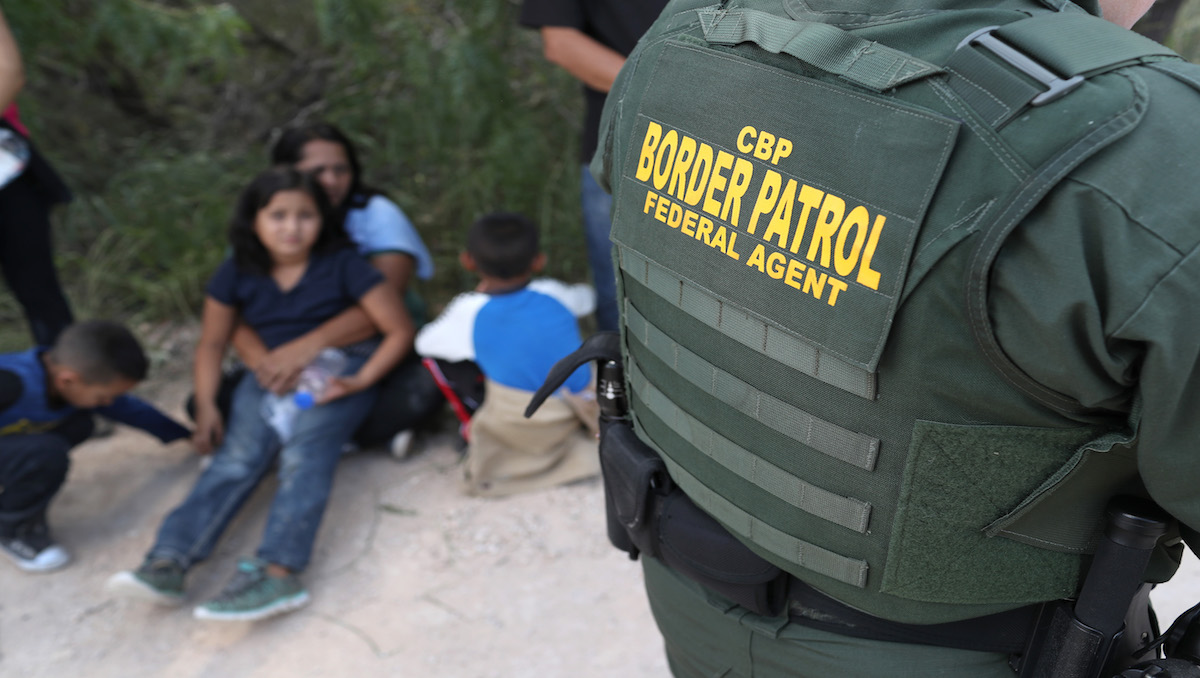
The Trump administration’s policy of separating migrant children from families in the name of deterrence is essentially supported by one specific section of the federal code.
Repealing–or severely altering–this one particular law would go a long way toward immediately constraining the administration’s border and immigration agencies as they separate families from one another and confine their children in cages.
The law in question is located at 8 U.S.C. §1325(a); this is the precise statute cited by U.S. Customs and Border Protection on their website in regards to the administration’s zero tolerance policy (confirmed on April 6). The statute reads, in relevant part:
Improper time or place; avoidance of examination or inspection; misrepresentation and concealment of facts
Any alien who (1) enters or attempts to enter the United States at any time or place other than as designated by immigration officers, or (2) eludes examination or inspection by immigration officers, or (3) attempts to enter or obtains entry to the United States by a willfully false or misleading representation or the willful concealment of a material fact, shall, for the first commission of any such offense, be fined under title 18 or imprisoned not more than 6 months, or both…
First things first. This law decidedly does not mandate the separation of anyone from anyone else. It follows that this law absolutely does not mandate the separation of children from their adult family members. Various statements to this effect have emanated from the White House and other administration officials like Attorney General Jeff Sessions and Department of Homeland Security Secretary Kirstjen Nielsen, but that’s simply not true.
That said, the law cited above–8 U.S.C. §1325(a)–does allow for exactly what is occurring: separation and caging. There’s an obvious disconnect here and things have gotten increasingly confusing because of a failure to distinguish between a new enforcement priority and previous use of enforcement discretion.
So, let’s be extremely clear here: The Trump administration absolutely has the legal authority to do what they’re currently doing at the U.S.-Mexico border. That’s because enforcement priorities recently shifted toward the “zero tolerance” outlook for migrants attempting to enter the country without the proper documentation. Prior to that, the Trump administration–as well as the previous two administrations–used their enforcement discretion and decided against employing zero tolerance.
Laws are written by Congress with enforcement discretion and priorities in mind–but it’s up to the Executive branch how that goes. Here, “discretion” and “priority” aren’t particularly fancy legal words. They mean more or less the same thing as one might think. When immigration officers exercise discretion they’re likely choosing the least harsh application of law. When those same authorities shift priorities–toward, say, zero tolerance–they’re likely signaling a harsher interpretation of the law is on the way.
And that’s exactly what’s happening on the border. Returning to the text of 8 U.S.C. §1325, the law notes, “Any alien who…enters or attempts to enter the United States at any time or place other than as designated by immigration officers [shall be] imprisoned not more than 6 months.” Because of this provision, the Trump administration is legally allowed to prosecute immigrants who enter anywhere other than designated ports of entry. Or, as Secretary Nielsen herself acknowledged in an interview with NPR:
Operationally what that means is we will have to separate your family.
Once an adult immigrant is processed and charged with the underlying misdemeanor of illegal entry, their children are separated from them. There’s no singular process for how this occurs because border zones are vastly different from one another and border judges operate on fairly different wavelengths.
Essentially, however, the adult immigrant, after being referred by CBP, is placed in jail under the custody of the Department of Justice. Meanwhile, children are placed under the jurisdiction of Health and Human Services and then sent to the Office of Refugee Resettlement. After certain proceedings, the adults are then transferred to Immigration and Customs Enforcement for removal proceedings. Sometimes the children–some of whom are given numbers by DHS; some of whom are not–remain in the country under supervisory detention or are passed on to extended family or sponsors if available.
For those keeping score: that’s at least five federal agencies tasked with various functions of the zero tolerance-cum-family separation policy. Perforce, or perhaps by design, those agencies have difficulty communicating with each other. Children often don’t know where their parents are–indeed they’re often too young to understand what is even happening. Parents are sometimes told their children are being taken elsewhere; sometimes they’re not. It’s mostly an ad hoc process at this point.
If Congress chose to, this section could be rewritten or entirely expunged from the federal code in a matter of weeks. The question is one of political will. The most obvious way to do this is by turning unlawful entry into a strictly civil penalty and explicitly providing that criminal prosecution for such immigration violations is precluded by statute.
One last wrinkle: Since the family separation policy is not on paper in the form of a statute, Trump, Sarah Huckabee Sanders and others keep proclaiming they’re just “enforcing the law.” This is both true and false depending on how you approach it for the reasons described above. Yes, the law is being enforced. But it simply doesn’t have to be enforced this way.
If Trump’s opponents are serious about stopping the operational policy of family separation and caging children, the federal government’s statutory authority to criminally punish undocumented immigrants must be knocked out from underneath the current administration–and every potentially harsh administration that comes after.
[John Moore/Getty Images]